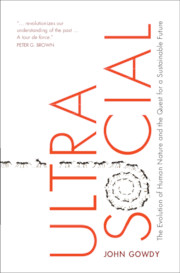Book contents
- Ultrasocial
- Reviews
- Ultrasocial
- Copyright page
- Dedication
- Contents
- Figures
- Tables
- Preface
- Acknowledgments
- Part I The Evolution of Human Ultrasociality
- Part II The Rise and Consolidation of State/Market Societies
- 5 The Rise of State Societies
- 6 The Modern State/Market Superorganism
- 7 Neoliberalism
- Part III Back to the Future
- Notes
- References
- Index
7 - Neoliberalism
The Ideology of the Superorganism
from Part II - The Rise and Consolidation of State/Market Societies
Published online by Cambridge University Press: 09 October 2021
- Ultrasocial
- Reviews
- Ultrasocial
- Copyright page
- Dedication
- Contents
- Figures
- Tables
- Preface
- Acknowledgments
- Part I The Evolution of Human Ultrasociality
- Part II The Rise and Consolidation of State/Market Societies
- 5 The Rise of State Societies
- 6 The Modern State/Market Superorganism
- 7 Neoliberalism
- Part III Back to the Future
- Notes
- References
- Index
Summary
The forces that reorganized human society that came with the agricultural revolution still control and constrain our social evolution today. The human global economy has become a global, unified, interlocking system of resource extraction and surplus production. Integral to this system are institutions and belief systems supporting it. Today, neoliberalism is the dominant ideology supporting the ultrasocial system. Far from supporting individual freedom, it is a philosophy that defends sacrificing the well-being of individuals for the benefit of the global market. Fredrich Hayek, one of the leading figures of neoliberal thought, was influenced by biological theories of group selection and recognized that the market economy was a kind of superorganism. Neoliberals explicitly argue that the market is a supreme information processing system, far superior to human reason. The political agenda of neoliberals is twofold: to protect the market from public regulation and to promote government spending to expand market activity.
- Type
- Chapter
- Information
- UltrasocialThe Evolution of Human Nature and the Quest for a Sustainable Future, pp. 129 - 146Publisher: Cambridge University PressPrint publication year: 2021

